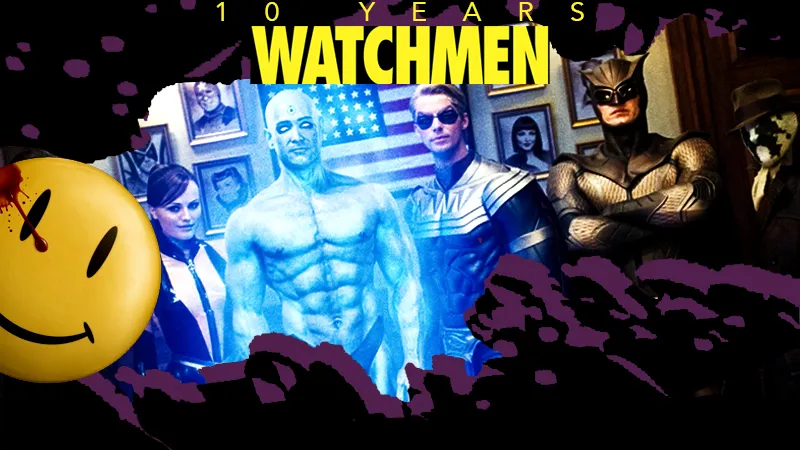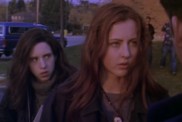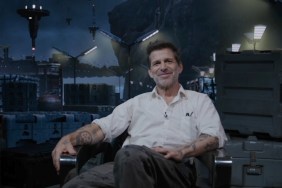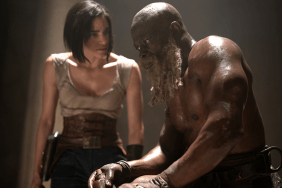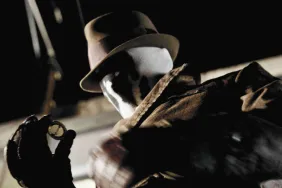One of the most hotly anticipated superhero movies of all-time opened ten years ago on this day, March 6, 2009. Zack Snyder‘s Watchmen came into cinemas with enormous expectations riding on its adaptation of what many consider to be the Citizen Kane of the comic book realm. The fact that it failed to meet those expectations for many -including Warner Bros., who saw it go down in flames at the box office with $185 million worldwide against a $140 million budget- is not surprising, but it was also in many ways ahead of its time and quite possibly as close as anyone could ever get to capturing the book in a commercial motion picture. Now that the dust has long since settled, let’s take a quick look back at the cultural event and fan lightning rod that was the Watchmen movie, and feel free to let us know your own thoughts on the film in the comments below!
RELATED: Masks Save Lives in New HBO’s Watchmen Teasers
BACKGROUND
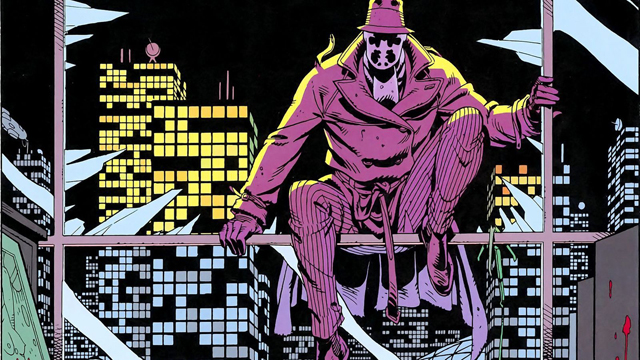
The idea of turning Watchmen into a movie was first tasked to visionary filmmaker Terry Gilliam (Brazil, 12 Monkeys) by producers Lawrence Gordon (Hellboy, The Rocketeer) and Joel Silver (The Matrix, Lethal Weapon) in the late 80’s for 20th Century Fox. The producers had purchased the rights the year the title hit the stands in 1986, with Silver eyeing Arnold Schwarzenegger for Dr. Manhattan. Gilliam actually met with the Watchmen comic’s prickly genius writer Alan Moore, who tried to discourage him from making the film, saying that it couldn’t possibly be done right. Despite a script by Batman writer Sam Hamm that was later rewritten by Brazil‘s Charles McKeown, Gilliam’s film eventually collapsed due to lack of funding, and the filmmaker’s belief that the material would be better served as a 5-hour miniseries. Even in these early attempts to wrangle the complex plot into a two-hour film, the idea was always to change the “giant squid invasion” ending of the book, which was itself inspired by The Outer Limits episode “Architects of Fear” (something Snyder paid homage to in the final film). The initial revised ending involved some of the heroes time traveling to our own timeline.
In the early 2000s Gordon hired X-Men‘s David Hayter to draft up a new script that would ultimately form the spine of the film that would eventually be made. The film also shifted from Fox to Warner Bros. to Paramount, with Gordon briefly inviting Gilliam back to helm it independently, but the director declined. Several filmmakers became attached including Hayter himself, Black Swan‘s Darren Aronofsky (who was only involved briefly) and eventually Bourne franchise director Paul Greengrass, who planned to shift the events of the story from an alternative 1985 to present day to address more modern political concerns. Greengrass actually got quite far along, including having everything designed, sets partially built and even some characters cast including Paddy Considine as Rorschach, Ron Perlman as The Comedian, Joaquin Phoenix as Nite Owl, Hilary Swank as Silk Spectre II and both Jude Law and Tom Cruise lobbying for Ozymandias. Despite Paramount putting up an official movie website promising the film for 2006, a regime change at the studio led to budget cuts and eventually the film being put into turnaround.
Warner Bros. eventually purchased the rights back from Paramount, and though James McTeigue -director of Warners’ successful Alan Moore adaptation V For Vendetta– was briefly rumored, the studio settled on Zack Snyder. At the time Snyder was fresh from commercial and music video work, and had only released the 2004 remake of Dawn of the Dead. However, the studio was impressed with what they had seen from his Frank Miller adaptation 300, and decided to let he and writer Alex Tse revise Hayter’s script. Once 300 became a global phenomenon, Snyder had the perfect amount of clout to get Warners to commit to a big budget and, for the first time in the project’s history, an R-rating.
THE GOOD
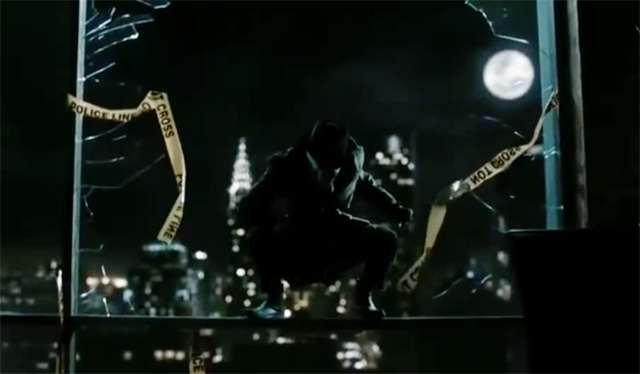
No one could ever accuse Snyder of not being true to the spirit of the Watchmen graphic novel. Arguably no other film has ever gone to such painstaking lengths to make a movie FEEL like the panels in the comic book, from the Gunga Diner to Treasure Island to even animating the Black Freighter comics for the Ultimate Edition. What Snyder also gets right is the tone. A lesser director would have cut all the humor and satire and focused on the grimdark of it all, but the humor and sly fun that Alan Moore was having deconstructing the superhero genre is all there on display.
The story of a massive conspiracy uncovered by Rorschach and company, initially suspected of a plot to take down costumed heroes, is handled with verve and a good pace. You never feel like the important details are being truncated, nor do you feel any bloat with the sheer number of characters, subplots and backstory. It was a balancing act, and clearly a lot of care went into retaining not just the visuals but the important story points of the tale.
The casting is also fantastic, from Jackie Earle Haley’s psychopathic black & white worldview as Rorschach, to Billy Crudup’s haunting portrayal of Doctor Manhattan’s slow slide away from human feeling, to Patrick Wilson’s sympathetic schlub role as a Nite Owl that’s lost his mojo.
There are some bravura sequences as well, including the opening historical montage taking us through this alternate timeline, to the capture of Rorschach by the SWAT team, to the burning building hero work with Nite Owl and Silk Spectre. A lot of people have complained that the film glorifies/fetishizes the violence, but if anything the visceral breaking of limbs and moments of gore help drive home the consequences of when a so called “hero” unleashes their powers on others.
THE BAD
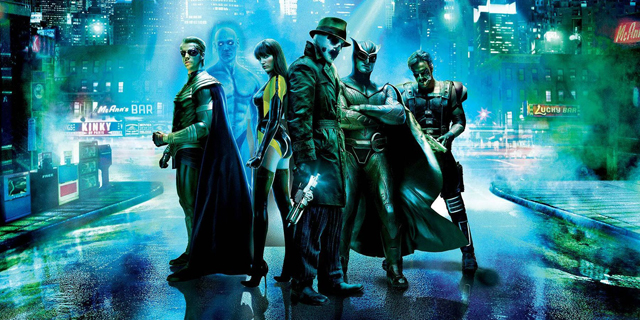
Not everyone in the cast is worthy of kudos, unfortunately. Malin Åkerman’s portrayal of Laurie has been somewhat unfairly maligned, especially in a film that features far more egregious scenery chewing from Carla Gugino in full Norma Desmond-mode, to Jeffrey Dean Morgan’s insincerity as the brutish Comedian, to Matthew Goode’s performance of an Ozymandias cast as a kind of pedophile Nazi Bond villain.
Some of the music choices are also dreadfully miscalculated, from Simon & Garfunkel’s maudlin “Sound of Silence” over The Comedian’s funeral to My Chemical Romance’s pop punk rendition of “Desolation Row” literally marring the film’s powerful final moments. The slow-mo speed ramping that Snyder and DP Larry Fong utilized being accused of overuse is not without merit either.
As for the film’s controversial ending, which recasts the original Giant Alien Squid premise with Ozymandias framing Doctor Manhattan for several nuclear-level destructive events, it is not terrible for not doing the squid. The squid would never have worked simply because it would have looked silly onscreen and broken an already overstuffed structure with its complicated plan. However, the new device doesn’t quite work either because it intrinsically links with Ozymandias, who has been working with Doctor Manhattan publicly and would be immediately suspected alongside Doc. There would certainly be investigations into Ozy after such a catastrophic act of global terrorism. Flipping the idea of Robert Redford running for president to Ronald Reagan running for president also does not align with the world Moore was trying to set up at the end of the book, and somewhat defeats the purpose.
THE FUTURE

While the film may not have tapped into the zeitgeist in 2009, the following ten years have proved kind to Watchmen. With a whole Marvel Cinematic Universe of heroes, not to mention the DCEU, the public is much more familiar with the archetypes the story was trying to deconstruct. The film still looks gorgeous as well, with so many of the sets and costumes built practically under the guidance of brilliant production designer Alex McDowell. Its aesthetic of one part Taxi Driver, one part Dr. Strangelove and two parts Blade Runner with a smidge of The Man Who Fell to Earth is pure eye candy and contains many layers of both beauty and meaning.
Moore himself has also sworn off any involvement with film properties adapting his work, having his name removed from both Watchmen and V For Vendetta. Snyder tried to apply the same deconstructionist attitude to the proper DC Universe with Man of Steel, Batman v Superman and Justice League, proving an ill fit even while attempting to overcorrect in tone on the latter.
Since the Watchmen film came out DC Comics have taken what was once considered a sacred text and strip mined it for worthless comics spinoffs like the prequel Before Watchmen and sequel Doomsday Clock, both without Moore or Gibbons’ involvement.
And now controversial TV figure Damon Lindelof is attempting a TV series pseudo-sequel to the Watchmen comic, with Jeremy Irons as an older Adrian Veidt/Ozymandias in a future world where superheroes are treated as outlaws. The very loose adaptation will arrive on HBO later this year.
What are your thoughts on the 2009 Watchmen film? Has it aged well over the last ten years? Let us know your thoughts in the comments below!
Watchmen
-
Watchmen Date
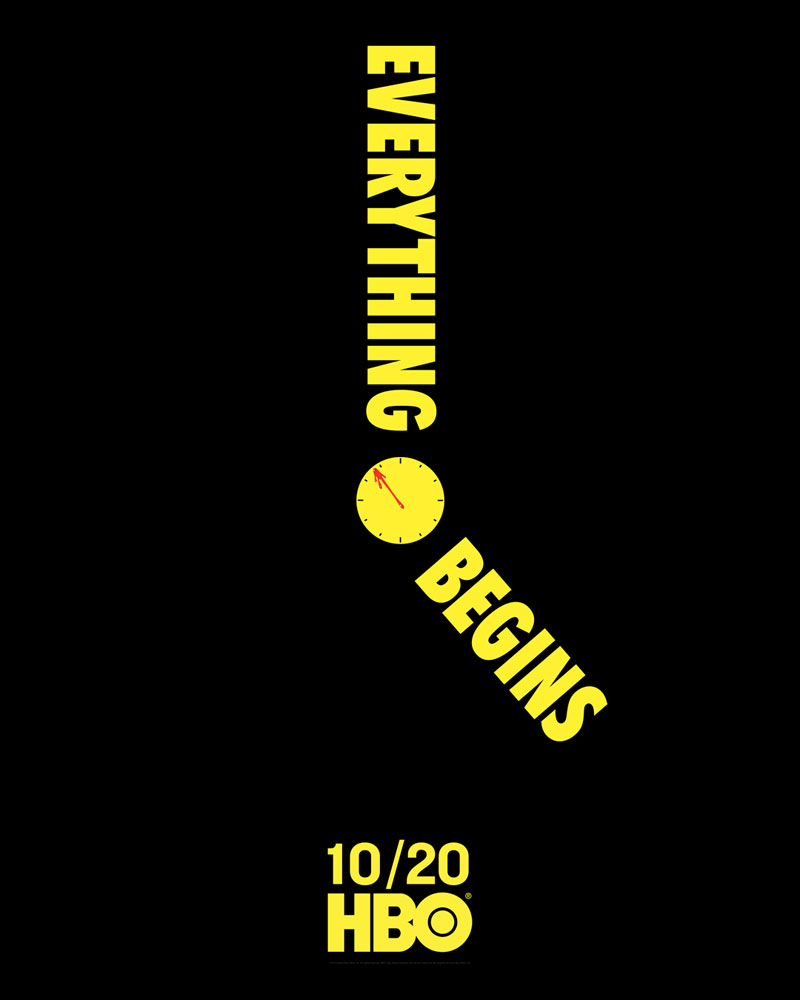
-
Watchmen_1.jpg

-
Watchmen_2.jpg

-
Watchmen_poster_2.jpg

-
Watchmen_3.jpg

-
Watchmen_4.jpg

-
Watchmen_5.jpg

-
Watchmen_6.jpg

-
Watchmen_7.jpg

-
Watchmen_8.jpg

-
Watchmen_9.jpg

-
Watchmen_10.jpg

-
Watchmen_11.jpg

-
Watchmen_12.jpg

-
Watchmen_13.jpg

-
Watchmen_14.jpg

-
Watchmen_15.jpg

-
Watchmen_16.jpg

-
Watchmen_17.jpg

-
Watchmen_18.jpg

-
Watchmen_19.jpg

-
Watchmen_20.jpg

-
Watchmen_21.jpg

-
Watchmen_22.jpg

-
Watchmen_23.jpg

-
Watchmen_24.jpg

-
Watchmen_25.jpg

-
Watchmen_26.jpg

-
Watchmen_28.jpg

-
Watchmen_29.jpg

-
Watchmen_30.jpg

-
Watchmen_31.jpg

-
Watchmen_32.jpg

-
Watchmen_33.jpg

-
Watchmen_34.jpg

-
Watchmen_35.jpg

-
Watchmen_36.jpg

-
Watchmen_37.jpg

-
Watchmen_38.jpg

-
Watchmen_39.jpg

-
Watchmen_40.jpg

-
Watchmen_41.jpg

-
Watchmen_42.jpg

-
Watchmen_43.jpg

-
Watchmen_44.jpg

-
Watchmen_45.jpg

-
Watchmen_46.jpg

-
Watchmen_47.jpg

-
Watchmen_48.jpg

-
Watchmen_49.jpg

-
Watchmen_50.jpg

-
Watchmen_51.jpg

-
Watchmen_52.jpg

-
Watchmen_53.jpg

-
Watchmen_54.jpg

-
Watchmen_55.jpg

-
Watchmen_56.jpg

-
Watchmen_57.jpg

-
Watchmen_58.jpg

-
Watchmen_59.jpg

-
Watchmen_60.jpg

-
Watchmen_61.jpg

-
Watchmen_62.jpg

-
Watchmen_63.jpg

-
Watchmen_64.jpg

-
Watchmen_65.jpg

-
Watchmen_66.jpg

-
Watchmen_67.jpg

-
Watchmen_68.jpg

-
Watchmen_69.jpg

-
Watchmen_70.jpg

-
Watchmen_71.jpg

-
Watchmen_72.jpg

-
Watchmen_73.jpg

-
Watchmen_74.jpg

-
Watchmen_75.jpg

-
Watchmen_76.jpg

-
Watchmen_77.jpg

-
Watchmen_78.jpg

-
Watchmen_79.jpg

-
Watchmen_80.jpg

-
Watchmen_81.jpg

-
Watchmen_82.jpg

-
Watchmen_83.jpg

-
Watchmen_84.jpg

-
Watchmen_85.jpg

-
Watchmen_86.jpg

